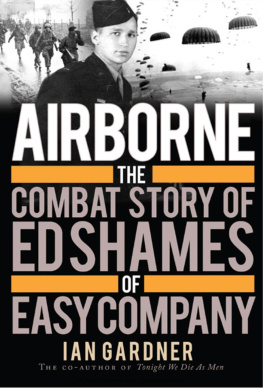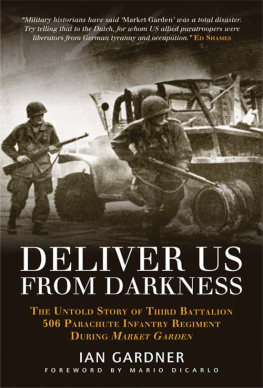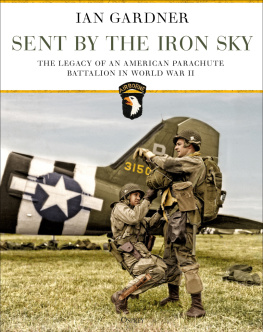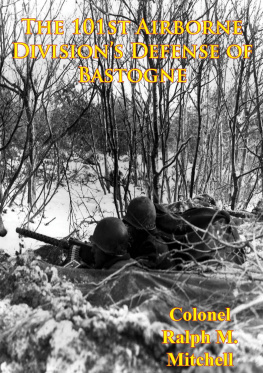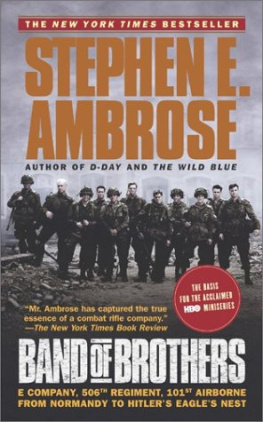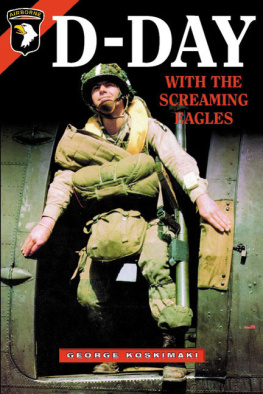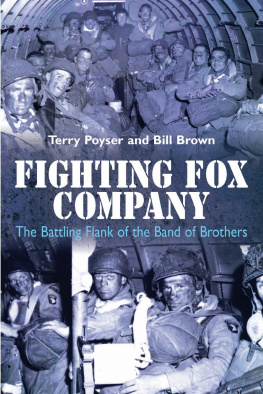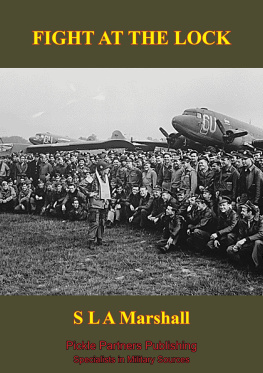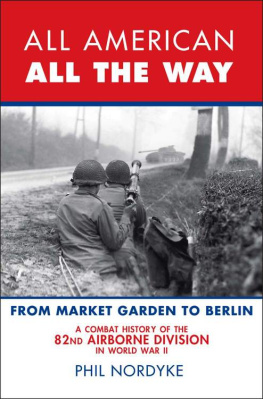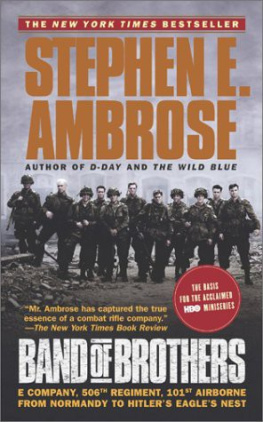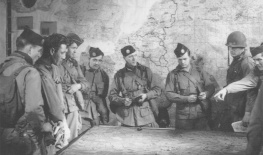AIRBORNE

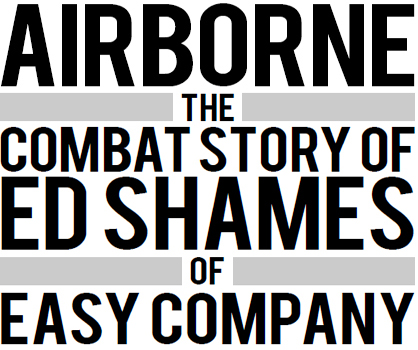
IAN GARDNER
FOREWORD BY JAMES C. ROBERTS
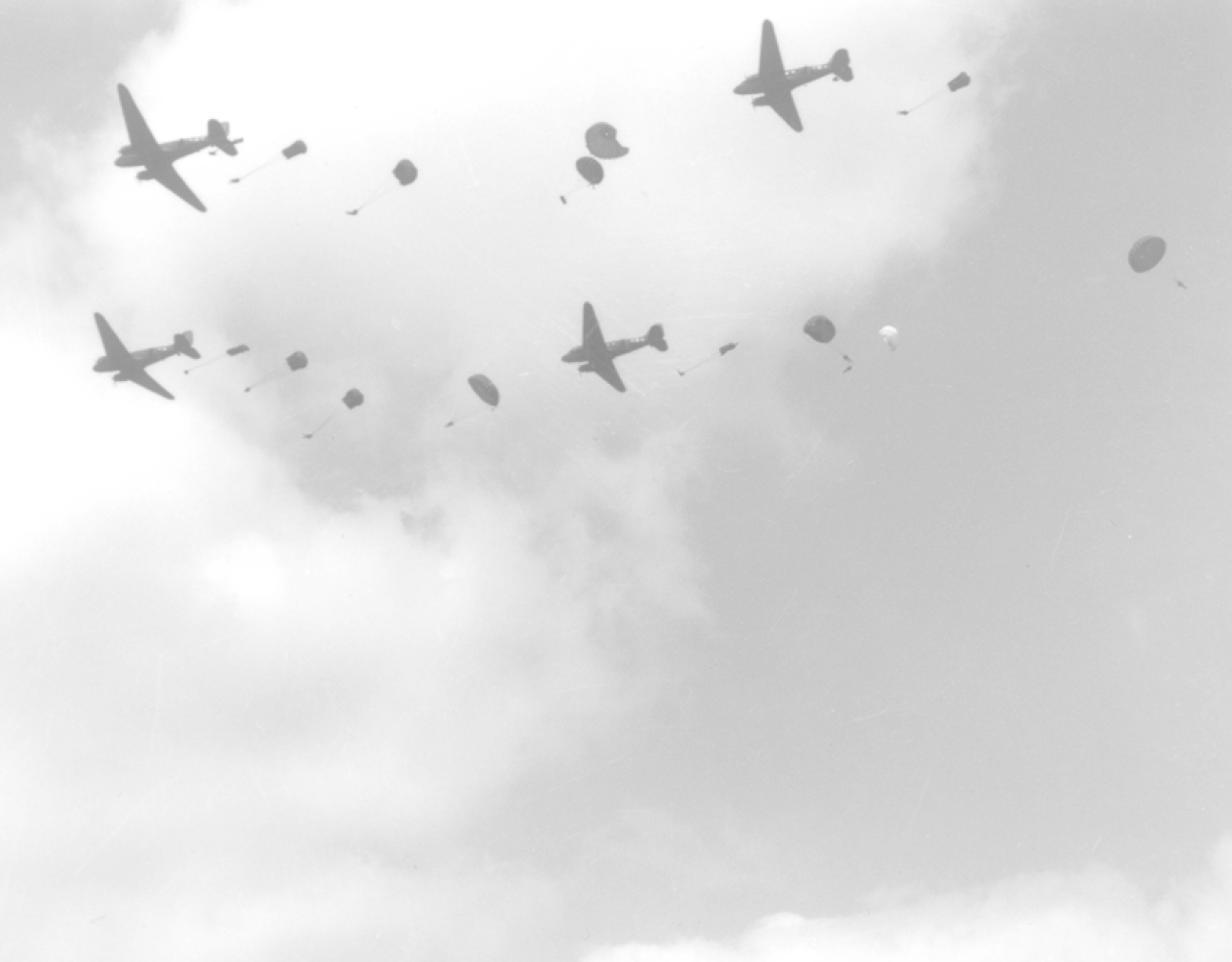
DEDICATION
I would like to dedicate this book to the following soldiers: Paul Rogers, Amos Taylor, Roderick Strohl, Forrest Guth and Joseph Madona.
These soldiers made me the soldier I became!
Edward D. Shames
God Almighty! In a few short hours we will be in battle with the enemy. We do not join battle afraid. We do not ask favors or indulgence but ask that, if you will, use us as your instrument for the right and an aid in returning peace to the world. We do not know or seek what our fate will be. We only ask this, that if die we must, that we die as men would die, without complaining, without pleading and safe in the feeling that we have done our best for what we thought was right. Oh Lord! Protect our loved ones and be near us in the fire ahead, and with us now as we each pray to you.
Colonel Wolvertons prayer on the eve of
3rd Battalions insertion into Normandy
(5th June 1944)
CONTENTS
2. Beyond golden fields
Ramsbury, England
3. The other side of tomorrow
The marshaling area, Exeter
4. The river runs red
D-Day, the wooden bridges at Brvands
5. Five seconds to forget
England, August 1944
6. Bullets from the sun
The invasion of the Netherlands
7. Dead mens shoes
Zeeland and Tilburg
8. The bucket list
The Island Fall 1944
9. The rain drank champagne
Mourmelon-le-Grand, France
10. Faith and justice
The Battle of the Bulge Bastogne
11. Northwind
Haguenau and the Colmar Pocket
12. Ruhr Pocket
Western Germany, April 324, 1945
13. Last stand
Berchtesgaden and Austria
14. Ameritocracy
Life after war
FOREWORD
From 1996 until 2005 I served as founder and president of the World War II Veterans Committee and from 2005 until the present I have been president of its successor organization, the American Veterans Center.
Our mission throughout all these years has been to recognize and honor our veterans legacy of service and sacrifice and to preserve their stories for future generations. In the course of my work I have been privileged to meet and get to know hundreds of veterans, from Frank Buckles, the last American veteran of World War I, to newly returned servicemen and women from Afghanistan.
Among all these individuals, Colonel Ed Shames occupies a special place. He is, to use an overwrought phrase, a true American hero. A member of the legendary E Company, 506th Regiment of the 101st Airborne Division now known globally as the Band of Brothers in World War II, Colonel Shames was the first member of this storied division to receive a battlefield commission after D-Day.
The arc of his amazing life is traced in this book, which follows Shames from the quiet streets of Virginia Beach, Virginia to the new airborne training camp at Toccoa, Georgia; from rigorous training at bases in England to the historic D-Day landings of June 1944; from nearly continuous battles, including Operation Market Garden in Holland, to the heroic defense of Bastogne in Belgium; from heavy fighting through Germany to a visit to Hitlers Eagles Nest retreat in Bavaria where Shames helped himself to a monogrammed bottle of the Fhrers cognac. (A bottle that was opened on a deliciously ironic, wildly improbable and triumphantly fitting occasion: the celebration of his sons Bar Mitzvah 17 years later.)
Along the way we read of Colonel Shames encounter with Martin Bormann, detention of Feldmarschall Albert Kesselring, and a gut-wrenching tour of Dachau he was one of the first American officers to visit that horrific hellhole and the visit still haunts him seven decades later.
We also meet many memorable characters along the way, including Colonel Robert Sink, portrayed memorably in Band of Brothers by actor Dale Dye, and Ida, Colonel Shames wife of 70 years, a lovely, vivacious and spunky lady who is a fully worthy match for her tart-tongued husband every step of the way. When Eddie returned home in 45, Ida told me, the real war began.
Ed Shames remains amazingly strong and vibrant at the age of 92 and his memories of the war are remarkably vivid and detailed, and all ably related in this book by author Ian Gardner, who supplies rich context and historical detail.
I have spent many, many enjoyable hours chatting with Colonel Shames and listening with rapt attention to his personal accounts of World War II. He is a master storyteller and I have lamented to him many times what a shame it was that a larger audience could not hear his story.
I rejoice to say that with the publication of Airborne his story has been told at long last. It is a valuable addition to the historical record as we mark the 70th anniversary of the end of World War II.
James C. Roberts
President, American Veterans Center
Great Falls, Virginia
INTRODUCTION
As a former British Airborne Reservist, I have always been interested in the history of the sky soldiers from World War II, especially the American 101st Airborne Division. My first book about 3rd Battalion, 506th Parachute Infantry Regiment, in Normandy Tonight We Die As Men was co-written with Roger Day and published by Osprey in April 2009.
I am in no doubt that my limited military background was one of the reasons why over fifty 3rd Battalion veterans put their trust in me. Trust is an easy word to use but despite my obvious connection, I feel it still had to be earned, which is why Tonight We Die As Men took almost six years to research and piece together. Roger was already well established as a semi-professional historical writer and it was his skill and patience that helped shape the book into what I believe is a first-class piece of non-fiction literature.
Unlike many of our peers, we were not professors of history or university lecturers. Although in theory this should have held us back and maybe in some ways it did it quickly became apparent, at least to me, that having no official academic qualifications was sometimes of benefit when it came to dealing with the old boys. Most felt that my casual open approach and sense of humor helped them relax without feeling intimidated or self-conscious.
As my contributor list grew by word of mouth, I spent hundreds of hours on the telephone getting to know my guys and their families, all the while learning more and more about their individual experiences on D-Day and beyond. Almost like method acting, it became easier for me to contextualize the huge amount of information being passed to me. Luckily, I found a family in St-Cme-du-Mont a close-knit village in Normandy near to where much of the 506th action took place who were willing to take me under their wing. Subsequently, I spent a lot of time in country with Michel Lonard, occasionally even accompanied by some of the veterans, talking with locals who, we must not forget, were also caught up in the fighting following up leads, finding new ones, but always reporting back after each trip to discuss any details with each relevant contributor.
Since Tonight We Die As Men was published, I have followed the exact same research process to produce two further highly detailed volumes Deliver Us From Darkness
Next page
